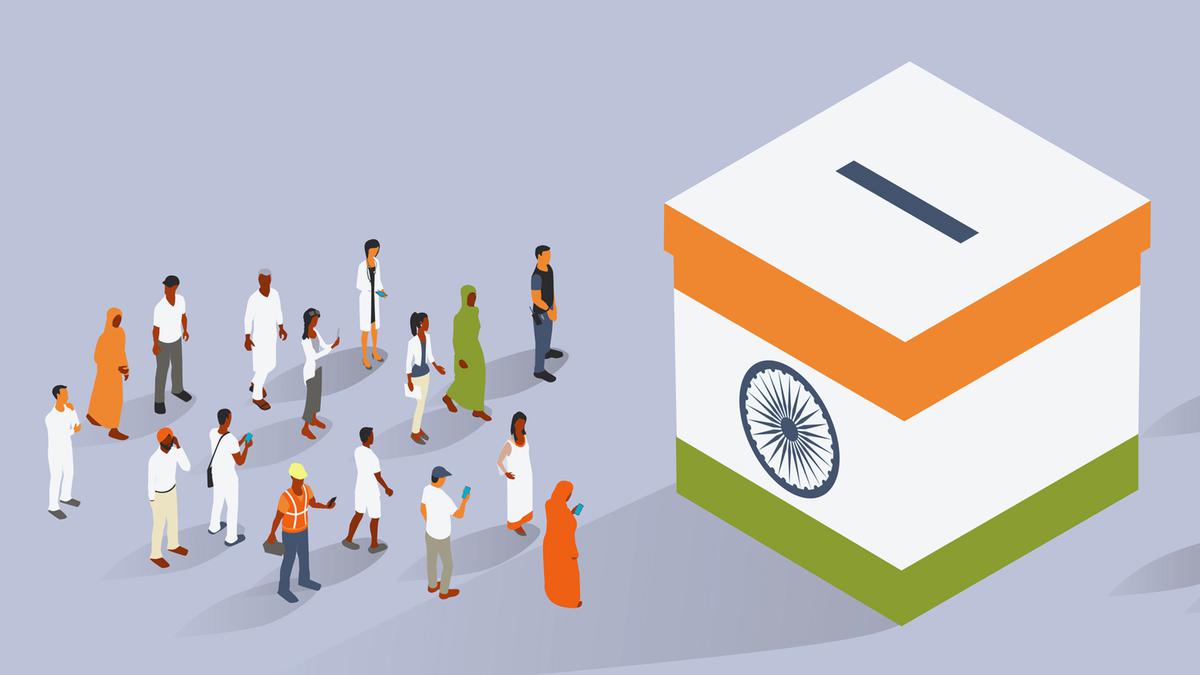
Behind the numbers: Delhi’s youth ahead of 2024 elections Premium
The Hindu
As India gears up for the next general elections, a study reveals the preferences and opinions of first-time voters.
As India prepares for the next general elections, a lot of discussions revolve around the participation of first-time voters in what is referred to as the ‘festival of democracy’. The Election Commission of India (ECI) is actively promoting voter registration, with the introduction of four registration windows in a year. Several States have already signaled an increased number of first-time voters compared to the 2019 Lok Sabha elections, reflecting a growing engagement of the youth in the democratic process.
Recognising the crucial role these voters play, political parties are actively making efforts to connect with first time voters. On National Voters’ Day, observed on January 25th, Prime Minister Narendra Modi, during the ‘Nav Matdata Sammelan,’ urged first-time voters to ensure their registration in the voters list. He also asked them to suggest inputs for the party’s 2024 manifesto. Similarly, during his Bharat Jodo Yatra, Rahul Gandhi engaged in exclusive interviews with YouTubers as a move to reach out to the youth. With the 2024 elections just around the corner, political parties are strategically reaching out to millions of first-time voters, recognising the importance of their support and participation.
A recent study by Lokniti-CSDS interviewed 1,290 first-time voters (47% young men and 53% young women) in Delhi, hoping to understand their perspectives on politics, their voting intentions, and their opinions on key pressing issues.
When it comes to the level of interest in politics among first-time voters, we asked them whether young individuals like themselves should be concerned about the country’s affairs, or if it’s a matter primarily for the older generations. Nine of every ten (91%) first-time voters expressed the view that they should indeed stay informed about these matters. Six per cent indicated a strong inclination to follow but admitted difficulty in understanding, while a mere 2% believed that such concerns were better left to the seniors.
When directly asked about their level of interest in politics, one-third (36%) of the first-time voters expressed a substantial interest, while four of every ten (43%) indicated a moderate level of interest. Only two in ten first-time voters conveyed either minimal interest or no interest at all in politics. This indicated a visible inclination towards political engagement among this demographic (Table 1). When it comes to engaging in political discussions, over six of every ten (60%) of the youngsters expressed that they actively participate in conversations about politics with friends and family. This indicated a substantive level of engagement about politics among the youth, demonstrating their heightened interest and connection to political developments. However, do young people’s interest in politics translate into action, such as registering to vote and voting in the upcoming Lok Sabha elections?
More than half (51%) of first-time voters in Delhi are yet to register themselves. Upon closer examination, a notable trend surfaces. Among the 18-year-olds, a striking three-quarters are yet to register (Table 2). The trend persists as we look at those aged 19 years, with over half (56%) failing to register. However, there’s a gradual decrease in this proportion of those non – registered for subsequent age groups.
While half the unregistered individuals (51%) plan to register for the upcoming elections, the rest cite various reasons for not doing so. Among these, two of every ten (19%) cite the lack of time and one of every ten (11%) were unsure of whether their registration had been accepted. One-sixth (16%) gave a range of other reasons — facing registration obstacles due to a lack of required documents, lack of interest in voting, lack of knowledge about the registration process, and applications were rejected (Table 3).

The Karnataka government has drafted a comprehensive master plan for the integrated development of Kukke Subrahmanya temple, the State’s highest revenue-generating temple managed by the Hindu Religious Institutions and Charitable Endowments Department. The redevelopment initiative is estimated to cost around ₹254 crore and aims to enhance infrastructure and facilities for devotees.












